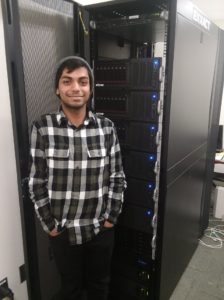Physics department facilities are housed in Carr Hall. In 1995, a multi-million-dollar renovation doubled the space available for physics. Renovations included a new laser and spectroscopy lab, a non-linear optics lab, modern physics laboratories, and a new technology classroom. In addition, a welcoming lounge is available to all students.
Research Laboratories
- Low temperature molecular spectroscopy laboratory: for the study of gas-phase molecular interactions at very low temperatures
- State-of-the-art non-linear optics laboratory: for the study of non-linear optical phenomena, equipped with two diode lasers, two Argon ion lasers, a Q-switched Nd:YAG laser, and a dye laser.
- Molecular biophysics lab: for the study of the active sites of metalloproteins
- Simulation laboratories: supports teaching and research using computer simulation including molecular dynamics, Monte Carlo methods, and computational hydrodynamics
- Computing facilities: network of personal computers and workstations; two dedicated student computer labs—an introductory mechanics lab with 10 iMacs and a departmental computer lab with several computers for the exclusive use of physics majors. A variety of sensors, such as motion detectors, force probes, and radiation counters, are used with the mechanics lab machines to permit data collection and analysis.
Teaching Laboratories
- Two introductory labs
- Modern physics lab (intermediate)
- Optics lab (advanced)
- Laser and spectroscopy lab
- Electronics lab
Equipment
- Computer-interfaced, sophisticated equipment for the detection of motion, force, light, x-rays, gamma rays, etc.
- Research-grade equipment for the study of lasers, optics, and atomic and molecular spectroscopy
Astronomy Facilities
- Wible Planetarium
- Newton Observatory: houses a nine-inch refracting telescope and a computer-interfaced 10-inch Meade LX200 telescope with CCD camera
